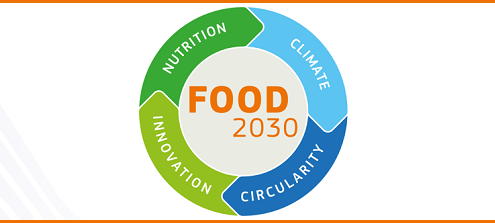
FOOD 2030 will host its next high-level event on 16 October 2020 (World Food Day), in partnership with the Food and Agriculture Organisation of the United Nations, and the German EU presidency.
The title of the event is “FOOD 2030 – Transforming food systems through Research & Innovation”.
It will be an online event, that will take place between 12:15h and 14:30h (Central European Summer Time or Brussels time).
It will bring together researchers, innovators, policy makers, actors, stakeholders and civil society for a participatory discussion on the transition to sustainable food systems and, in particular, on the key role of research and innovation therein.
Food 2030 – a timely EU research and innovation policy response to the recent international policy developments including the SDGs and COP21 commitments- is built on key Food and Nutrition Security priorities:
Food 2030 was launched after the 2015 Milan World Expo, when Commissioner for Research and Innovation, Carlos Moedas, announced his intention to launch a Food Research Area by World Food Day 2016.
The first FOOD 2030 event took place in 2016, and the science policy dialogue on FOOD 2030 was held in 2017 on World Food Day. In 2018, the FOOD 2030 high-level event was organised under the Bulgarian Presidency.
This 2019 edition of FOOD 2030 will take place on World Food Day, in Brussels, on 16 October. This year’s theme is “Nourishing people and nurturing the planet through sustainable healthy diets for all”. It is co-organised by the European Economic and Social Committee, the European Commission, the Food and Agriculture Organization, and the Committee of the Regions. The event will be webstreamed.
by secretary
by secretary
by secretary
by secretary
by secretary
by secretary
by secretary
by secretary
by secretary
by secretary
by secretary
by secretary
by secretary
by secretary
by secretary
by secretary
by secretary
by secretary
by secretary
by secretary
by secretary
by secretary
by secretary
by secretary
by secretary
by secretary
by secretary
by secretary
by secretary
by secretary
by secretary
by secretary
by secretary
by secretary
by secretary
by secretary
by secretary
by secretary
by secretary
by secretary
by secretary
by secretary
by secretary
by secretary
by secretary
by secretary
by secretary
by secretary
by secretary
by secretary
by secretary
by secretary
by secretary
by secretary
by secretary
by secretary
by secretary
by secretary
by secretary
by secretary
by secretary
by secretary
by secretary
by secretary
by secretary
by secretary
by secretary
by secretary
by secretary
by secretary
by secretary
by secretary
by secretary
by secretary
by secretary
by secretary
by secretary
by secretary
by secretary
by secretary
by secretary
by secretary
by secretary
by secretary
by secretary
by secretary
by secretary
by secretary
by secretary
by secretary
by secretary
by secretary
by secretary
by secretary
by secretary
by secretary
by secretary
by secretary
by secretary
by secretary
by secretary
by secretary
by secretary
by secretary
by secretary
by secretary
by secretary
by secretary
by secretary
by secretary
by secretary
by secretary
by secretary
by secretary
by secretary
by secretary
by secretary
by secretary
by secretary
by secretary
by secretary
by secretary
by secretary
by secretary
by secretary
by secretary
by secretary
by secretary
by secretary
by secretary
by secretary
by secretary
by secretary
by secretary
by secretary
by secretary
by secretary
by secretary
by secretary
by secretary
by secretary
by secretary
by secretary
by secretary
by secretary
by secretary
by secretary
by secretary
by secretary
by secretary
by secretary
by secretary
by secretary
by secretary
by secretary
by secretary
by secretary
by secretary
by secretary
by secretary
by secretary
by secretary
by secretary
by secretary
by secretary
by secretary
by secretary
by secretary
by secretary
by secretary
by secretary
by secretary
by secretary
by secretary
by secretary
by secretary
by secretary
by secretary
by secretary
by secretary
by secretary
by secretary
by secretary
by secretary
by secretary
by secretary
by secretary
by secretary
by secretary
by secretary
by secretary
by secretary
by secretary
by secretary
by secretary
by secretary
by secretary
by secretary
by secretary
by secretary
by secretary
by secretary
by secretary
by secretary
by secretary
by secretary
by secretary
by secretary
by secretary
by secretary
by secretary
by secretary
by secretary
by secretary
by secretary
by secretary
by secretary
by secretary
by secretary
by secretary
by secretary
by secretary
by secretary
by secretary
by secretary
by secretary
by secretary
by secretary
by secretary
by secretary
by secretary
by secretary
by secretary
by secretary
by secretary
by secretary
by secretary
by secretary
by secretary
by secretary
by secretary
by secretary
by secretary
by secretary
by secretary
by secretary
by secretary
by secretary
by secretary
by secretary
by secretary
by secretary
by secretary
by secretary
by secretary
by secretary
by secretary
by secretary
by secretary
by secretary
by secretary
by secretary
by secretary
by secretary
by secretary
by secretary
by secretary
by secretary
by secretary
by secretary
by secretary
by secretary
by secretary
by secretary
by secretary
by secretary
by secretary
by secretary
by secretary
by secretary
by secretary
by secretary
by secretary
by secretary
by manager
by manager
by manager
by manager
by manager
by manager
by manager
by manager
by manager
by manager
by manager
by manager
by manager
by manager
by manager
by manager
by manager
by manager
by manager
by manager
by manager
by manager
by manager
by manager
by manager
by manager
by manager
by manager
by manager
by manager
